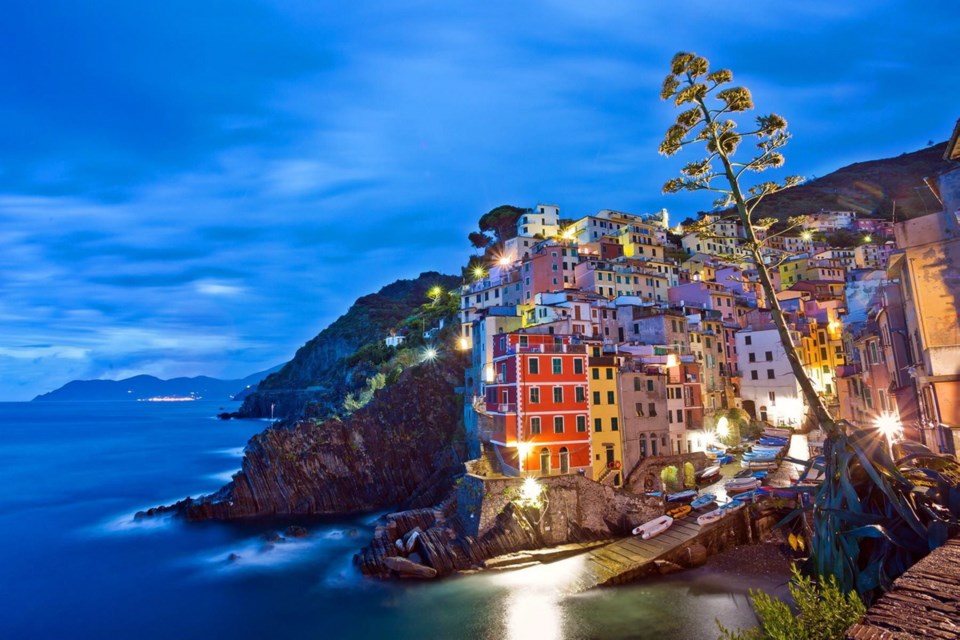When I first came to the Cinque Terre, then an isolated stretch of the Italian Riviera south of Genoa, it was a classic “back door:” a string of five pastel-hued hamlets clinging to craggy seaside slopes and surrounded by steep, rocky vineyards.
It was authentic, romantic and without a tourist in sight. Fast forward several decades and the once-sleepy villages are on Instagram bucket lists and mobbed in high season by organized tours and cruise-ship excursions.
The resident population of the five towns (Monterosso, Vernazza, Corniglia, Manorola and Riomaggiore) is just 4,000 — but it’s estimated that 2.5 million travelers visit annually. And it’s not just foreign tourists who flock here: Italians love the Cinque Terre too.
The result, especially when day-trippers hit, is that trains and station platforms are often mob scenes, the iconic coastal hiking trail becomes almost impassable, and the towns’ tiny lanes are clogged to bursting.
Even so, I still recommend this seductive corner of Italy. You can (and should) have a wonderful time here. Avoid the worst of the logjams by following these tips:
Consider your timing. April can be ideal, with fewer crowds and cooler temperatures. The busiest months are May, June, September and October; July and August can be less congested (but hotter).
Avoid holiday weekends — especially Easter and Italian Liberation Day (April 25). I thought reports of catastrophic crowds were exaggerated until I was there over a three-day weekend. On one recent Easter, 95,000 visitors to little Vernazza caused shoulder-to-shoulder gridlock.
Sleep in the Cinque Terre — not nearby. The towns of Levanto and La Spezia are near the Cinque Terre and well connected by train, making them popular home bases. But it’s easier to take advantage of the cool, relaxed, and quiet morning and evening hours if you’re sleeping in one of the five towns.
Skip town at midday. Cruisers and day-trippers start pouring into the Cinque Terre around 10 a.m. and typically head out by 5 p.m. Those midday hours are your time to hit the beach or find a hike away from the main trails.
Be a reverse commuter: Leave town during the day and come back in the late afternoon, just as the crowds are thinning out.
Hire your own boat. If the regularly scheduled boats between towns are overwhelmed, consider hiring your own boat to zip you to the next village.
Captains hang out at each town’s harbour, offering one-way transfers to other towns and sightseeing cruises. It’s cheaper than you might think (about $35-60 US) and very affordable if you split it among three or four travellers.
Figure out alternative, crowd-free activities. When the towns and trails are jammed, find something fun to do that’s off the beaten path. For example, pick a scenic spot for a wine tasting (the Cinque Terre is known for its white wine made from bosco grapes) or sign up for a pesto-making class (the tasty basil-and-nut sauce originated here).
Hike smartly. Most travelers aim for the well-known main coastal trail, which can be a human traffic jam and very hot at midday. Making things even worse, recent landslides have closed two key segments of the trail, pushing more hikers onto the remaining pathway.
If you’re determined to hike it, go early (by 8 a.m.) or late (around 4 or 5 p.m.). Before setting out on an evening hike, find out when the sun will set — there’s no lighting on the trails.
Escape to alternative trails and towns. If you hear that it’ll be a busy cruise day, plan your activities elsewhere.
If you’d like to hit the beach but Monterosso’s is a parking lot of bodies, hop the train a few minutes to Levanto, rent a bike and pedal on a level path to the delightful (and far less-crowded) beaches at Bonassola or Framura.
You don’t have to join the tourist conga line on the coastal trail either. The entire Cinque Terre is crisscrossed with hiking trails where you’ll scarcely encounter another person. The offices of the Cinque Terre national park (there’s one in each town) are a great resource for learning about your options.
Don’t let the vertical terrain intimidate you. On a recent trip, I smartly took advantage of the shuttle buses that connect the towns to higher trailheads: I rode up, soaking up the scenery, then hiked down.
Those upper trailheads are often where you’ll find remnants of much older Cinque Terre settlements, including evocative cemeteries and age-old churches. High above the tourist crowds, I could hear the birds and feel the maritime air pushed up with the breeze — and I was alone. The tranquility was heaven.
I’ve come back to the Cinque Terre nearly every year for decades. And though the region is now well discovered, I love that the magic still survives — if you know where to find it.
Rick Steves (ricksteves.com) writes European travel guidebooks and hosts travel shows on public television and public radio. Email him at rick@ricksteves.com and follow his blog on Facebook.



